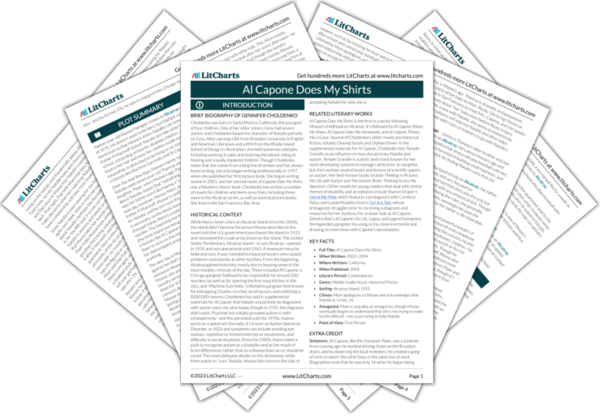The way that various characters think about and interact with Natalie’s beloved button box mirrors how they view her—and specifically, whether they see her as a full person with agency, or whether they see her as someone they can control. One aspect of Natalie’s autism is that she obsessively counts and organizes her buttons into elaborate grids, something that, at the beginning of the novel, Mom, Mr. Purdy, and even Mrs. Kelly see as inappropriate and as indicating that Natalie just needs to be forced to behave to their standards. They all try to take her buttons away in an attempt to “cure” or “fix” her, believing that if they deny her the buttons, the rest of her odd behavior will simply stop.
Moose, however, finds taking Natalie’s buttons away cruel, and so he makes a point to give them to her every afternoon and hide them before Mom gets home. The other kids on the island also accept Natalie’s buttons as just a part of who Natalie is, and they bring her rocks and feathers for her to add to her arrangements. This is one way they show Natalie that they respect her—her love of buttons is, their behavior seems to suggest, little different than Jimmy’s love of creating machines, Theresa’s flair for drama, or Annie’s insistence on dutifully doing her homework, quirks and qualities that the children just accept. Thanks to this, the children of Alcatraz become Natalie’s first friends in her life. Unlike adults who wish to mold Natalie and make her who they’d like her to be, the children appreciate Natalie for who she is.
The Button Box/Buttons Quotes in Al Capone Does My Shirts
“Dad! Could you show me the cell house, and then maybe could we play ball?” I sound like I’m six and a half now, but I can’t help it. He’s been gone forever and I hardly got to see him at all yesterday. It’s lonely in my family when he’s not around.
His smile seems to lose its pink. He puts Natalie’s buttons down in two careful piles, gets up and brushes his uniform off.
I follow him into the kitchen. “You’re not working today, are you?”

Unlock explanations and citation info for this and every other Al Capone Does My Shirts quote.
Plus so much more...
Get LitCharts A+“Whatever you say, Mom,” I say, watching Nat fuss with her clothes like something’s too tight.
“What’s the matter?” I ask Natalie.
“She’s fine,” my mother answers for her. “We’ve been all over. We’ve had a lovely day.” My mom glances quickly at me and then away.
“She looks upset.”
“It’s just hot, that’s all.” My mom rubs her neck.
“She wants her buttons.”
“Well...yes...,” my mom admits. “But I’m sure once you take her out, she’ll forget all about it. Mrs. Kelly says it’s just a matter of redirecting her attention.” My mom’s voice isn’t quite so sure as her words are. She and Natalie have clearly had a hard time today.
“Don’t you think it’s kind of mean, taking her buttons away?”
We sit with her. Annie and Theresa, Jimmy and me. Keep her company wherever she’s gone.
That is the way my mom finds us when she gets off the boat, her music bag over her shoulder.
[...]
“Get them out of here.” My mom spits the words out.
“Mom, it’s—”
“I won’t have her made a spectacle.”
“It’s really not like that. They like her,” I say.
“NOW, Moose.”
“Stop it! Stop it!” I have my hands on Nat’s arms. I want to shake her, shake her hard. My arms tremble with the effort not to.
Natalie screams louder. I look into those trapped eyes. Wherever she is, she can’t get out, which only makes her scream louder. And suddenly I’m not angry anymore.
“I know what Mrs. Kelly says. I’m talking about Moose now and what he thinks. He’s good with Natalie. They’ve worked out a relationship. We have to respect that and trust him.”
“Well, yes, but—”
“You have to let him care about her his way.”
And then something I can’t hear.
“I got one child who has everything,” my mom says, “big, strapping, healthy, smart...makes people laugh. Got kids coming over looking for him night and day, just like at home. Little ones, big ones and the girls—they all like Moose. But Natalie, Natalie doesn’t have the whole world looking out for her. She needs me.”
“Moose needs you too.”












